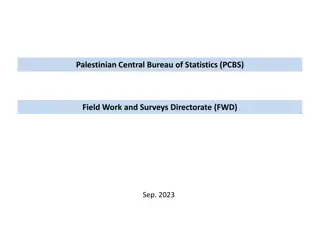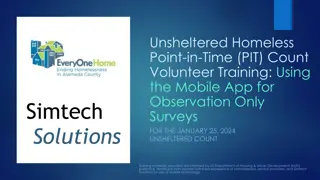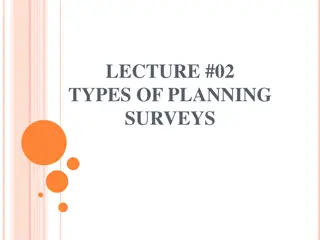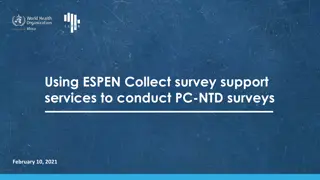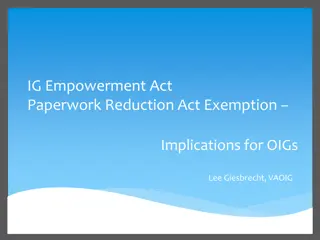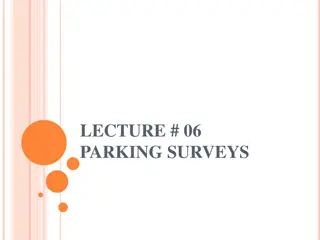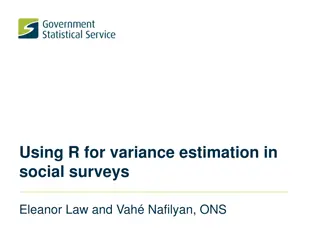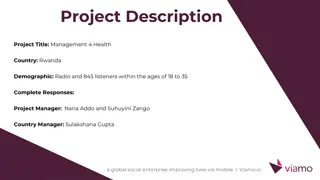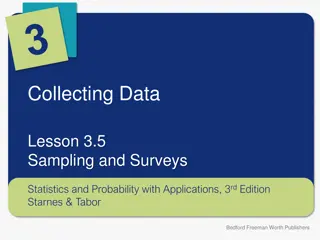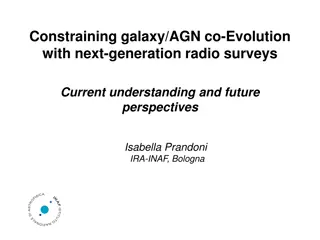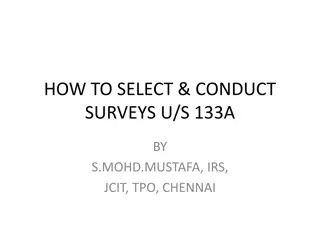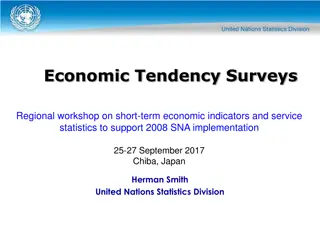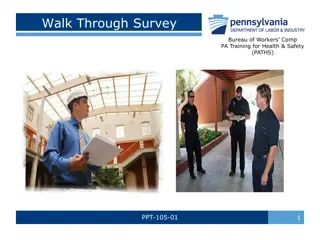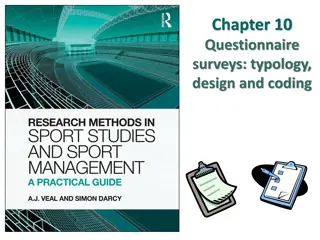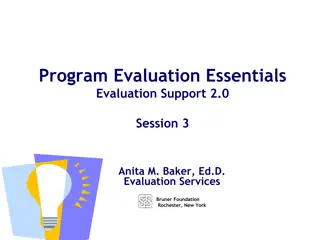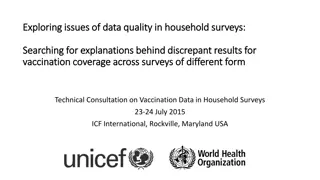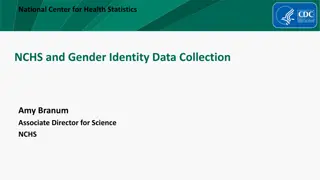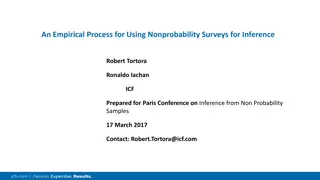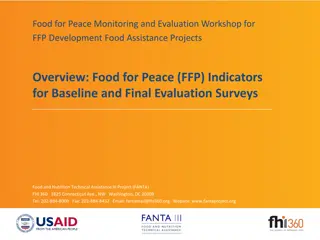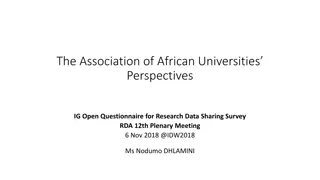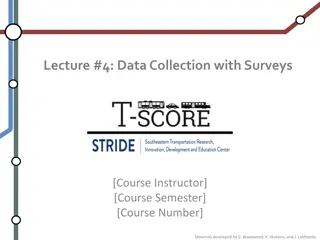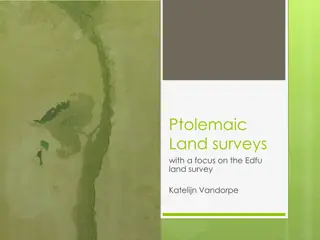Actions Emanating from the Evaluation of the Governance Reform
The evaluation of the governance reform within the WMO aimed to assess its alignment with strategic objectives, effectiveness in responding to societal needs, coordination efficiency, decision-making process, agility, and more. Evaluation criteria included relevance, design validity, effectiveness,
1 views • 13 slides
Palestinian Central Bureau of Statistics Field Work and Surveys Directorate Overview
The Field Work and Surveys Directorate of the Palestinian Central Bureau of Statistics (PCBS) plays a crucial role in data collection, editing, coding, and management. They conduct various surveys and censuses, monitor data collection processes, and raise statistical awareness in the local community
2 views • 10 slides
Unsheltered Homeless PIT Count Volunteer Training using Mobile App
The volunteer training for the January 25, 2024, Unsheltered Count involves using a mobile app for observation-only surveys. Training materials are based on HUD guidance and feedback from those with lived homelessness experience. Volunteers will be assigned locations to canvas and conduct surveys us
0 views • 7 slides
Types of Planning Surveys for Urban Development
Planning surveys play a crucial role in urban development by categorizing various types of surveys like Land Use, Housing, Socio-economic, and Transportation surveys. Each survey type serves a specific purpose, such as determining land allocation, studying housing conditions, assessing socio-economi
1 views • 17 slides
Universal Evaluation Framework: Simplifying Evaluation Processes
This session introduces the Universal Evaluation Framework (UEF) developed for evaluating QAA Scotland Enhancement Themes. Participants learn key evaluation questions, evidence capture, and the Theory of Change to enhance evaluation confidence. The QAA Scotland Evaluation Odyssey details historical
2 views • 14 slides
Implementing Blind Evaluation Pilot in HORIZON EUROPE: Key Facts and Process
HORIZON EUROPE is conducting a pilot on Blind Evaluation in the 2023-2024 work program to address biases in the research and innovation evaluation process. The pilot aims to assess the feasibility of blind evaluations in ensuring fairness and mitigating potential biases towards well-known organizati
9 views • 9 slides
Exploring Developmental Evaluation for Better Decision-Making
Delve into the realm of developmental evaluation, focusing on its purpose, principles, and application in practice. Understand how developmental evaluation emphasizes real-time data collection for informed decision-making in complex systems. Learn about key principles such as developmental purpose,
0 views • 25 slides
ESPEN Collect Survey Support Services for PC-NTD Surveys
Conducting PC-NTD surveys efficiently is crucial for NTD Programme Managers. ESPEN Collect offers a complete package of support, including protocol review by WHO experts, standardized training materials, real-time quality control dashboard, and more. Users can sign up by submitting a registration fo
0 views • 13 slides
Understanding Implications of IG Empowerment Act and Paperwork Reduction Act
The IG Empowerment Act provides beneficial provisions for Inspector Generals (IGs) such as exemptions from certain acts, including the Computer Matching Act and Paperwork Reduction Act. The Paperwork Reduction Act requires federal agencies, including IGs, to obtain OMB clearance before conducting su
1 views • 25 slides
Enhancing Evaluation Capabilities in Mongolia for Agenda 2030
The Mongolian Evaluation Network in collaboration with UNDP is working to integrate the 2030 Agenda into national strategies and plans, establish institutional coordination mechanisms, align budgets, and enhance data monitoring systems. Key stakeholders including government agencies, NGOs, and inter
0 views • 9 slides
Understanding Parking Surveys for Urban Planning
Parking surveys play a crucial role in urban planning and traffic management by providing data on parking space availability, usage, and demand. These surveys help in determining effective parking policies, such as pricing strategies and duration limits. Different types of surveys, including parking
0 views • 15 slides
Variance Estimation in Social Surveys: Using R for Complex Sampling
Explore the importance of social surveys in capturing key indicators like employment rates, spending, and wealth through a multistage sampling design. Learn about variance estimation in complex surveys, calibration techniques, and the linearised jackknife method for analyzing survey data. Discover t
1 views • 19 slides
Health Management Through Mobile Radio Surveys in Rwanda
A global social enterprise, Viamo, is conducting mobile radio surveys in Rwanda to improve health management. The surveys target 18-35-year-old radio listeners. The analysis of demographic data, complete responses, gender breakdown, and knowledge of the advert reveal valuable insights for enhancing
0 views • 44 slides
Understanding Evaluation in Education
Evaluation in education is a comprehensive term that encompasses measurement, testing, and qualitative examination of student behavior. It involves both quantitative and qualitative descriptions, along with value judgments. Differentiating from mere measurement, evaluation provides a deeper analysis
0 views • 28 slides
Understanding Bias in Sampling and Surveys
This lesson explores how undercoverage and nonresponse can introduce bias in sample surveys, affecting the reliability of the findings. Through examples like malnourished dogs and alumni income surveys, the text highlights how sampling methods can lead to skewed results. Understanding these biases i
0 views • 12 slides
Understanding Bias in Sampling and Surveys
Bias in sampling and surveys can arise from undercoverage, nonresponse, and response bias. Even when samples are randomly selected, various factors can lead to inaccurate results. Researchers need to be aware of these biases and take steps to minimize them, such as testing surveys before full deploy
0 views • 8 slides
Sustainable Evaluation Systems Workshop Summary
Workshop on Sustainable Evaluation Systems by Stephen Porter at the NEC Conference focused on defining evaluation systems, addressing their failures, and emphasizing the importance of quality, use, and networks in achieving sustainability. Participants engaged in activities such as bingo card introd
0 views • 38 slides
Co-Evolution of Galaxies and AGN with Next-Gen Radio Surveys: Insights and Prospects
Understanding the co-evolution of galaxies and active galactic nuclei (AGN) through next-generation radio surveys is crucial for advancing astrophysical knowledge. These surveys offer a comprehensive view of star formation, AGN activity, and AGN feedback mechanisms. The quest for multi-band informat
0 views • 18 slides
Guidelines for Conducting Surveys under Section 133A by S. Mohd Mustafa, IRS
Explore detailed insights on selecting and conducting surveys under Section 133A by S. Mohd Mustafa, covering the importance of surveys for assessment, recovery, and enforcing provisions like TDS/TCS. Understand the crucial role of surveys for gathering information related to stock verification, cas
0 views • 14 slides
NYC Parks & Recreation Natural Resources Group Marshbirds Surveys
NYC Parks & Recreation Natural Resources Group conducts surveys to study secretive marshbirds in New York City parklands, focusing on breeding bird surveys in different boroughs and call-response surveys. The group aims to understand and protect marshbird habitats by identifying species like Rails,
2 views • 15 slides
Impact and Evaluation Toolkit for Churches and Christian Charities
This toolkit aims to equip churches and Christian charities engaged in small-scale social action projects to think about impact, measure impact, choose data tools, reflect on evaluation data, and use it effectively. It covers principles of evaluation, setting objectives, selecting indicators, storyt
0 views • 34 slides
Handbook on Economic Tendency Surveys: Best Practices and Principles
This presentation highlights the Handbook on Economic Tendency Surveys, covering topics such as sample selection, questionnaire design, data processing, and dissemination of results. It outlines the objectives, preparation process, and importance of economic tendency surveys in capturing assessments
2 views • 38 slides
Overview of Monitoring and Evaluation in the GEF
The Evaluation in the GEF and Training Module focuses on promoting accountability and learning within the Global Environment Facility (GEF) through monitoring and evaluation activities. The GEF Independent Evaluation Office plays a crucial role in assessing results, effectiveness, and performance of
0 views • 25 slides
Understanding Walk Through Surveys for Health and Safety Training
This content provides valuable insights into conducting walk-through surveys as part of health and safety training. It covers topics like the difference between a walk-through survey and an inspection, the significance of conducting one, and when to conduct such surveys. The purpose of these surveys
0 views • 29 slides
Developing an Evaluation Work Plan for Effective Program Assessment
This presentation by Amy D. Andrade from San Jose State University focuses on developing an Evaluation Work Plan to identify responsibilities and timelines. It covers topics such as Evaluation Coaching Support, Webinar Outlines, Logic Model, Inputs-Outputs-Outcomes, Two Approaches to Evaluation, Pro
0 views • 29 slides
Exploring the Universe: X-Ray Surveys with Space Observatory
Delve into the fascinating world of X-ray surveys conducted by the Space Observatory at Khyung Hee University. Learn about the significance of X-ray surveys in detecting emission from hot regions of the Universe, minimizing errors in redshift measurements, extending the sample to higher redshifts, a
0 views • 16 slides
Understanding Questionnaire Surveys: Typology, Design, and Coding
This content explores the world of questionnaire surveys, covering topics such as different types of surveys (household, street, telephone, mail, e-surveys, and more), questionnaire design, coding, validity of data, and the process of conducting questionnaire surveys. It delves into the definitions,
0 views • 56 slides
Evaluation Synthesis in Changing Contexts: Enhancing Knowledge for Development Effectiveness
Evaluation synthesis is crucial for promoting learning, reflection, and decision-making in development work. This process involves bringing together diverse knowledge sources to generate strategic insights and facilitate wider use of evaluation findings. The Independent Office of Evaluation of IFAD
0 views • 20 slides
Maximizing E-Surveys for Effective Data Collection
Explore the strategic use of e-surveys for data collection, covering key decisions, creation essentials, question types, and analysis. Gain insights into leveraging technology for robust evaluation processes. Sponsored by the Bruner Foundation in collaboration with Evaluation Services.
0 views • 32 slides
Evaluation of FME Zero Emission Neighbourhoods in Smart Cities
The mid-term evaluation process of FME Zero Emission Neighbourhoods in Smart Cities involves self-evaluation, partner evaluation, and panel evaluation. The procedure includes scientific review, evaluation by scholars, and innovation assessment. Key documents like self-reports, progress reports, and
1 views • 20 slides
Overview of Regular Evaluation 2017 Findings in Estonia
In the Regular Evaluation 2017, efforts were made to maximize the benefits of evaluation outcomes for various stakeholders in Estonia such as the state, society, and institutions. The evaluation focused on a range of actions including preparing legislation, finding experts, creating self-report form
0 views • 6 slides
Exploring Data Quality in Household Surveys and Vaccination Coverage Discrepancies
This study delves into issues of data quality in household surveys, particularly focusing on vaccination coverage across different survey forms. It discusses the sources of information on infant immunization coverage, the utilization of survey results in evaluating program coverage levels, and the d
0 views • 18 slides
Comprehensive Guide to Training Evaluation Methods
This detailed guide covers the aim of evaluation, evaluation methods, techniques of evaluation, types of evaluation (formative, process, outcome, impact), and the significance of formative and process evaluation in assessing training effectiveness. Learn about the key principles and practices involv
0 views • 45 slides
Enhancing Employee Experience Through Data: Insights from Exit Surveys
Explore the significance of data lifecycle in improving the employee experience, from recruitment to exit surveys. Understand the key aspects of workforce representation, turnover analysis, and performance evaluation. Discover the purpose and process of conducting exit surveys to enhance recruitment
0 views • 8 slides
Importance of Gender Identity Data Collection in Health Surveys
Gender identity data collection is crucial for identifying health disparities among marginalized groups. National Center for Health Statistics (NCHS) emphasizes the need to include questions on sexual orientation and gender identity in surveys to address health equity. Initiatives like the NCHS Heal
0 views • 20 slides
Empirical Processes in Nonprobability Surveys for Inference
An examination of the use of nonprobability surveys for inference, detailing methods, comparisons to probability surveys, challenges, and future research areas. The content covers the motivation behind using Non-Probability Surveys (NPS), their usability, and comparisons to Probability Surveys (PS),
0 views • 15 slides
Understanding Food for Peace Indicators and Evaluation Surveys
This content provides an overview of Food for Peace (FFP) indicators for baseline and final evaluation surveys, with insights on collecting and analyzing data related to key indicators such as household food access, nutrition status, WASH, agriculture, poverty, gender, and family planning. It discus
0 views • 14 slides
Empowering African Universities through Data Sharing Surveys
The Association of African Universities aims to enhance the quality of higher education in Africa through data sharing surveys. With a network of 400 universities across the continent, they plan to implement open surveys to understand their constituency better and support the data needs of the Afric
0 views • 11 slides
Data Collection Methods in Surveys for Transit Rider Feedback
Explore the various types of surveys, methods of sampling, survey content, and instruments used in data collection for transit rider surveys. Learn about longitudinal and cross-sectional surveys, along with different survey methods such as self-administered written questionnaires, personal interview
0 views • 33 slides
Ptolemaic Land Surveys: Insights from Edfu Survey and Related Operations
Explore the intricacies of Ptolemaic land surveys, with a focus on the Edfu land survey conducted by Katelijn Vandorpe. Delve into main survey operations such as cadastral surveys and crop reports, discuss nome surveys at village levels, and analyze topographical land surveys highlighting personal d
0 views • 16 slides

